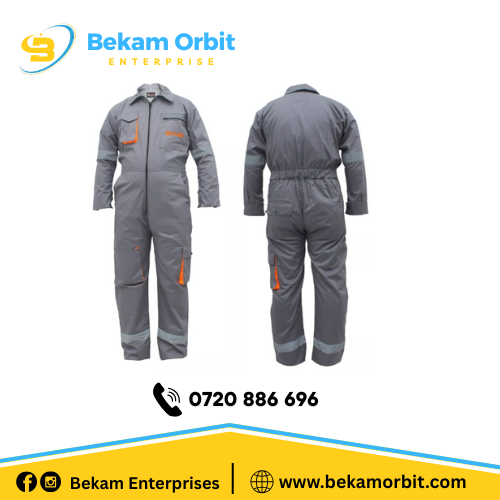In industries ranging from construction to manufacturing, safety is a top priority. Ensuring the well-being of workers is not only a legal obligation but also crucial for productivity and morale. One of the most vital components of personal protective equipment (PPE) is the boiler suit. This all-encompassing workwear garment is designed to provide workers with necessary protection, comfort, and visibility while meeting modern safety compliance standards. Boiler suits have evolved over the years, becoming an essential piece of body protection gear, offering significant advantages to those who wear them.
What Are Boiler Suits?
A boiler suit is a kind of body protection Gear typically made from durable materials like cotton, polyester, or specialized fire-resistant fabrics. They are designed to cover the entire body, offering protection from various workplace hazards. These suits are primarily worn by workers in industrial sectors, such as construction, manufacturing, mining, and energy. They provide full-body coverage to prevent injuries caused by spills, burns, cuts, and other workplace dangers.
The Importance of Boiler Suits in Workplace Safety
1. Protection Against Physical Hazards
Boiler suits are designed to safeguard workers from a wide range of physical hazards. In industrial environments, workers often face dangerous machinery, heavy equipment, sharp tools, and harsh materials that could result in cuts, abrasions, or burns. A high-quality boiler suit serves as a physical barrier, reducing the risk of injury.
For example, workers in the construction industry are exposed to falling debris and sharp objects. A boiler suit can help reduce the impact of these dangers, minimizing the likelihood of serious injuries. In industries such as welding or working with hot materials, fire-resistant boiler suits are used to prevent burns from sparks or molten metals.
2. Protection from Environmental Hazards
In addition to physical hazards, workers are also exposed to environmental factors such as extreme temperatures, dust, chemicals, and fluids. Boiler suits offer protection against these elements, ensuring that workers stay safe and comfortable. For instance, some boiler suits come with water-resistant or chemical-resistant coatings that protect workers from hazardous liquids or chemical splashes. In colder climates, insulated boiler suits provide warmth, allowing workers to continue their tasks in freezing temperatures without the risk of hypothermia.
3. High Visibility for Increased Safety
One of the most notable features of modern boiler suits is their high visibility. Many boiler suits are made with bright colors, such as orange, yellow, or reflective strips, to make workers easily visible in low-light or high-traffic areas. This is especially important in industries like construction and roadwork, where workers are often in close proximity to moving vehicles and machinery.
The high-visibility aspect of boiler suits helps reduce accidents caused by workers being unnoticed in their environment. Additionally, visibility becomes crucial when workers are in hazardous environments, where emergency responders need to locate them quickly in case of an accident.
4. Comfort and Flexibility
Although safety is the primary function of a boiler suit, comfort plays a significant role in the overall effectiveness of the garment. A well-designed boiler suit offers ample freedom of movement, allowing workers to perform their tasks efficiently without feeling restricted. Features like adjustable cuffs, waistbands, and zippers allow for a more tailored fit, ensuring comfort throughout the workday.
For jobs that require prolonged hours of physical activity, such as lifting, bending, or climbing, boiler suits made from breathable materials are essential. These suits allow air circulation to prevent overheating, while moisture-wicking fabrics keep workers dry, even during physically demanding tasks.
5. Long-Lasting Durability
Industrial environments can be tough on clothing. Boiler suits are made from durable, long-lasting fabrics that can withstand the rigors of demanding workplaces. They are designed to endure the wear and tear that comes from exposure to heavy equipment, rough surfaces, and chemical exposure. This durability ensures that workers remain protected over long periods without the need for frequent replacements.
Additionally, many boiler suits are machine washable, making them easy to maintain. The durability and longevity of these suits also provide significant cost savings for employers who need to supply safety gear for large workforces.
6. Boiler Suits and Compliance with Safety Standards
Workplace safety regulations often require specific types of personal protective equipment, including boiler suits, to ensure that workers are adequately protected. In many countries, OSHA (Occupational Safety and Health Administration) or similar regulatory bodies have specific standards for PPE, including the use of flame-resistant clothing in environments with fire or electrical hazards, and high-visibility clothing for workers in traffic zones.
By wearing boiler suits, employers demonstrate their commitment to safety compliance. These suits meet the standards set by regulatory authorities and ensure that workers are adequately protected while on the job. Not only does this help prevent accidents, but it also protects employers from potential legal liabilities that may arise due to inadequate safety measures.
The Role of Boiler Suits in Body Protection Gear
When discussing body protection gear, it’s essential to understand that boiler suits play a key role in offering complete coverage for workers. The comprehensive design of a boiler suit ensures that various parts of the body—such as the arms, legs, torso, and neck—are protected simultaneously. Unlike other protective clothing like gloves, helmets, or boots, which only safeguard specific body parts, boiler suits provide all-around protection.
For workers in high-risk industries like oil and gas, boiler suits often come with additional body protection features such as integrated fire-resistant material or the inclusion of flame-retardant fabrics. This additional layer of protection ensures that workers are safeguarded from the combined effects of heat, sparks, and hazardous materials.
The Future of Boiler Suits in the Workplace
As workplace safety standards continue to evolve, so will the design and functionality of boiler suits. Modern fabric technology is creating lighter, more breathable, and flexible boiler suits for better comfort and safety. Boiler suits with built-in health-monitoring sensors may also become common in hazardous jobs.
Conclusion
Boiler suits are essential in maintaining safety compliance and protecting workers in a wide variety of industries. With their ability to safeguard against physical, environmental, and visibility hazards, they remain a crucial component of personal protective equipment (PPE) in modern workplaces. From their durability to their comfort, boiler suits continue to evolve, ensuring workers’ safety and compliance in increasingly challenging work environments.










Leave a Reply